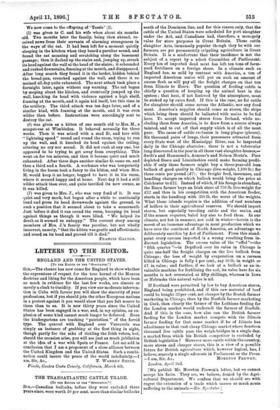THE TRANSATLANTIC CATTLE TRADE.
[To THE EDITOR Or TRY " SPECTATOR."] SIE,—Canadian bullocks, before they were excluded three years since, were worth 20 per cent. more than similar bullocks south of the Dominion line, and for this reason only, that the cattle of the United States were scheduled for port slaughter under the Act, and Canadians had, therefore, a monopoly value for store purposes in Great Britain. These cattle slaughter Acts, immensely popular though they be with our farmers, are yet permanently crippling agriculture in Great Britain. It is a misfortune that their incidence is not the subject of a report by a select Committee of Parliament. Every ton of imported dead meat has left ten tons of farm- yard fertilisers on a foreign shore. In a climate such as England has, so mild by contrast with America, a ton of imported American maize will put on such an amount of excess flesh as will pay all the freight charges on that ton from Illinois to Essex. The question of feeding cattle is chiefly a question of keeping up the animal heat in the system ; that heat, if not fostered by the atmosphere, must be stoked up by extra food. If this is the case, no fat cattle for slaughter should come across the Atlantic, nor any dead meat. America's supplies should come as stores, the ships which bring them should be ballasted with maize to be fed here. To accept imported stores from Ireland, while ex- eluding them from America, is to draw from a source always tainted, and to cut off that supply which is of all the most pure. The cause of cattle exclusion is lung-plague (pleuro). Six thousand pairs of lungs, their possessors attracted from every State west of the Mississippi River, can be inspected daily in the Chicago abattoirs ; there is not a tubercular lung discovered in the year in all those vast slaughter-houses,- Swift's and Hammond's, Armour's and Nelson Moris's. Poor depleted Essex and Lincolnshire could make farming profit- able if only those farmers might buy a three-year-old lean bullock of good quality in Chic ago (live-weight, 1,100 lb.) for three cents per pound (X7) ; the freight feed, insurance, and handling charges on which bullock would bring the price at Colchester to £12. Instead of which, if his forage is abundant, the Essex farmer buys an Irish store of 750 lb. live-weight for £12 and thus in his competition with the American feeder, starts in the handicap with 350 lb. the worst of the weights. What these islands require is the addition of vast numbers of heifers to their agricultural reserves. We should import stores, but especially breeding cattle and the maize, and if the season requires, baled hay also to feed them. In our climate, not hot in summer, not cold in winter—herein is the secret of an immense advantage in meat production which we have over the continent of North America, an advantage we deliberately sacrifice by Act of Parliament. From this stand- point every carcase imported is a wrong resulting from in- discreet legislation. The excess value of the "offal "—the "fifth quarter "—in Deptford over its value in Chicago is quite one-half the freight charges on the live bullock from Chicago ; the loss of weight by evaporation on a carcass killed in Chicago is fully 4 per cent., say 50 lb. in weight or £1 in value ; and further, if we look at a bullock as an in- valuable machine for fertilising the soil, its value here for six months is not overstated at fifty shillings, whereas in Iowa or Nebraska this natural value is nil.
If Scotland were permitted by law to buy American stores, England being prohibited, and if this raw material of beef could be bought 33 per cent. net cheaper by the Scotch farmer marketing in Chicago, than by the Norfolk farmer marketing in Cork, then clearly the farmer of the Lothians feeding for the London market would undersell the farmer of Norfolk. And if this is the case, how also can the British farmer feeding for the London market compete with the Illinois farmer feeding for that same market if he of Illinois has admittance to that vast cheap Chicago market where fourteen thousand live cattle pass the weigh-bridges in a single day, a market from which his British competitor is excluded by British legislation ? However more cattle within the country, more stores and cheaper stores, this is a view of a possible future for British agriculture which, however logical, has, I believe, scarcely a single advocate in Parliament or the Press.
[We publish Mr. Moreton Frewen's letter, but we cannot accept his facts. They are, we believe, denied by the Agri- cultural Department. We confess that we should see with regret the extension of a trade which causes so much acute suffering to the animals.—ED. Spectator.]


































 Previous page
Previous page